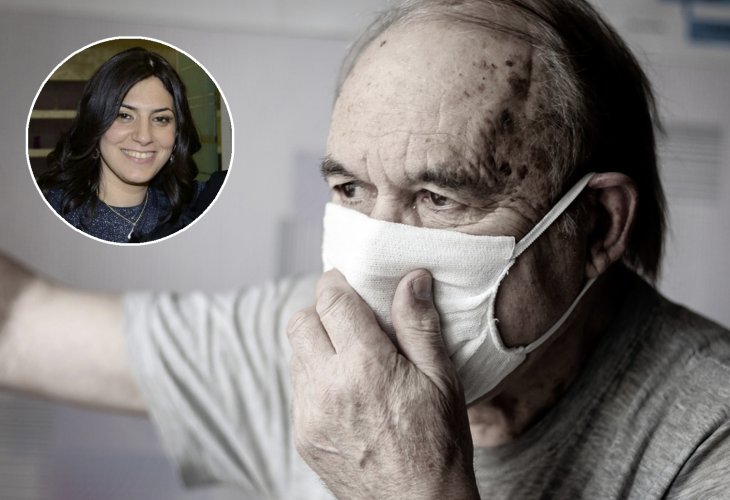"Elderly People Want to Cheer Up Other Seniors": Heartwarming Study Sessions of the Pandemic Era
Riki Siton, the manager of the "Chavruta" project, discusses the overwhelming demand for study partners that surged during the COVID-19 pandemic, an initiative sparked by a conversation with a Home Front Command officer, and how she deals with questions she can't answer herself.
 (In the circle: Riki Siton)
(In the circle: Riki Siton)The COVID-19 period took us out of the ordinary and familiar, and along the way, it seems, it also brought out a few good things in us. Riki Siton, manager of the "Chavruta" project, which works to create study partnerships between religious and secular individuals, was surprised to discover how much. "In the past, we had eight people a week looking for a chavruta, but during COVID-19, there were days when we had 80," she says. "There was a wave of awakening and readiness to listen, whether it was out of curiosity about what the ultra-Orthodox community was going through during this time, or the desire to understand what messages COVID-19 brings, and why all this is happening. People called us right up to the eve of Passover asking us to find someone for them to study with. The free time created, the fact that the phone became an ever-relevant tool, and especially the desire to do something meaningful, led to this blessed flood of calls."
"A Devout Secular Who Loves the Orthodox"
The Chavruta project was established by the "Ayelet HaShachar" organization, which works to connect and bring closer the different segments of society. As part of it, the organization's volunteers "match" observant individuals with those who are not, driven by the desire of both sides to learn and get to know Judaism together. "We currently have about 8,000 pairs, learning for 20 minutes a week over the phone, and we see how this chavruta creates wonderful connections that have very broad impacts," says Riki.
How does this connection impact the learners?
"First off, people discover how the person on the other side is just a person, not a 'detached Orthodox' or a 'leftist heretic'. My chavruta, for example, had the impression that all Haredi men were robots of the rabbi, all the women robots of the men, and the children robots of everyone. But once we started talking, she realized that we are normal people in every way, and that our children live, are happy, and also quarrel just like everywhere else. I can also talk about another chavruta, a doctor of education and one of the founders of a kibbutz, who has been studying with a Yeshiva student for years. He visited the Yeshiva student at home and at the kollel, and discovered a world he was unaware of. Suddenly he had access to the Jewish bookshelf; he has someone to talk about it with, and when such a person opens a page of Talmud, he exposes many others to it. We forgot for a moment, but this is a bookshelf not only for the observant but for all of Israel. Through the sense of connection and belonging to the spiritual assets of our people, the change begins."
In recent times, the impact of these chavruta sessions has been particularly noticeable in Riki's life. "When the extreme incitement against the ultra-Orthodox community began during COVID-19, a neighbor asked me how I was coping with it," she says. "I told her that a lot of people call me just to ask how we're doing these days and shower us with tons of love. You can clearly see how the difference between incitement, hate, and fear versus love and empathy is influenced by personal acquaintance. Suddenly, the secular doesn't seem so distant, and the Haredi person they know closely is a wonderful individual, all created through a 20-minute weekly chavruta."
Even Orna, Riki's chavruta, joined in the fight against incitement. "Orna is the chief graphic editor at the newspaper 'Yedioth Ahronoth', and after a long process we went through together, she now defines herself as a 'devout secular who loves the Orthodox'. She's from Tel Aviv, leftist, atheist, but during the time we went through about a month and a half ago, she found herself on our side. It was very important to her that people not view all of us as lawbreakers, she worked hard to moderate the atmosphere around her, and explained to everyone what the reality really was. Before the chavruta, she might have characterized herself as a 'devourer of Haredim', but due to our connection, the entire situation has changed."
The Chavruta That Sparked a Project for Seniors
If that weren't enough, 'Chavruta' has now launched another project – talks with seniors. "The elderly community is going through a tough time, and there are people who find themselves locked at home alone for a long period. They are hardly connected to the internet and media, and many of them are in terrible fear," Riki describes. "Desiring to help them, we created a collaboration with the Home Front Command – they referred us to nursing homes that were interested, and we took care of providing chavrutas for the elderly. Many volunteers registered for this project, both religious and secular, and the moving part is that even people aged 80 and 90 approached us, wanting to cheer up other seniors."
 (Photo: shutterstock)
(Photo: shutterstock)The collaboration with the Home Front Command also came about through the wonderful connections between different sectors. "Orna's daughter is a soldier in the Home Front Command, and a year ago she asked me to meet her officer to teach her about the Haredi public and refine the response needed for it," Riki explains. "Time passed, and when the harsh lockdown period began in Bnei Brak, my hometown, that officer was one of the many who called to check on me. Our conversation evolved into a desire to help the elderly, and together we managed to create the collaboration between us and bring this entire project to life. There was a broad mobilization to help, and thus the Home Front Command agreed to take this initiative even though it wasn't their role. In this context, it's important for me to say that if someone knows an elderly person sitting alone – don’t hesitate to call, and we will match them with a suitable chavruta."
What If I Don't Have an Answer?
When considering taking a chavruta, various concerns arise. The difficulty in committing to a set time, the fear of the questions we might encounter, and how to even start a conversation?
"Definitely," Riki agrees, "and that's why I didn't have a chavruta for years. I didn't believe I'd manage to fit it into my tight schedule as a mother of nine working full time. But eventually, I understood that it’s the perfect volunteering for a working mom, and for busy people in general, because it can be done alongside daily life and provides an amazing sense of satisfaction. For those without much time or the ability to leave home, it’s just a 20-minute investment a week, that’s all. Personally, I do it while folding laundry, and every time the pile of laundry grows, my husband already knows to ask when the next call is."
What about questions for which we might not have answers?
"First of all, we have no idea how each of us is practically a 'PhD' in matters of Judaism. We grew up with this foundation, it became part of our consciousness, and the truth is we know much more than we think. Beyond that, there might be questions we don't have answers to, and there's beauty in being able to say 'I don't know'. When my chavruta asked questions I didn't have answers to, I told her she’s winning against Riki Siton now, but not against Judaism. The fact that I don't know doesn’t mean there's no answer, and now both she and I have to look for it. Sometimes I might be the one to find it, and sometimes – if she’s serious – she will have to work independently to find it, and in any case, we both gain a lot from exploring and learning something new."
It can also raise complex questions we haven't thought about until now, and maybe shouldn't we think about?
"Firstly, we are accompanied by significant Torah guidance, as well as the advice and guidance of Israel's greats. When we asked Rabbi Steinman of blessed memory this question, he told us, 'We find that a little bit of light pushes away a lot of darkness, but not the opposite.' What happens is that the questions raised only strengthen and empower. Suddenly we’re asked why we say 'Modeh Ani' or the Shema prayer, and who really asks themselves on a daily basis why? What happens then is that we have to open a book and investigate the topic, and suddenly we also understand why we do these things, and the connection to the path we chose only strengthens. It's true that a person needs to check what anchors they come with, but generally, there's a huge spiritual gain here."
And how do you personally handle the questions from your chavruta?
"Many people come to learn Judaism purely, without too complex questions, but there are those, like Orna, who want to delve deeper, and that's truly challenging. I have encountered very complex questions and uncertainties as a result of studying with her, but I’ve been granted huge gains through this path. In the midst of life's race, I received a precious gift: the chance to reflect, appreciate what I have, and understand I truly live my life as I want. I spent hours clarifying and studying with my husband and rabbis, and there are also things that remain without understanding, and I live with that in peace. I don't know everything in many areas, certainly not in Torah study, and my faith is not dependent solely on understanding everything, but on much more than that."
Are there times when chavruta connections don't work out?
"That can happen, but generally, it doesn't take much to create a good connection between people. In any case, to establish a chavruta, we seek as broad a common denominator as possible, such as age, employment, suitable hours for contact, and even similar life struggles. For example, we have someone from Gibraltar learning with a chavruta from Sweden, and the commonality we found between them is that both are expatriates. Anyway, even if you try and it doesn’t work – at least an attempt was made. We support the connection as needed, and in the worst-case scenario – you can always try another chavruta."
Small Chavruta, Big Impact
To conclude, Riki says, "A meeting was formed here between individuals each of whom has a completely different lifestyle, and yet they manage to create common dialogue and a connection between them. We see amazing relationships that lead to mutual assistance, such as the case of a Haredi woman who fell ill, and her secular chavruta nursed her. Personally, my chavruta with Orna is counted as two women out of a few thousand, but in actuality, the acquaintance extends also between our families and friends, even impacting those she works with at the newspaper. I also found myself speaking at a high school where her daughter studies, giving 150 teenagers a glimpse into the Haredi world. The circles are very wide, and the significance of this connection is not only between the two of us but impacts many more people. In this context I can say, that when my husband once asked Rabbi Steinman of blessed memory if he should start this chavruta, the Rabbi answered that if as a result, one Jew hates another Jew less, then the answer is yes."
Interested in your own chavruta? You are welcome to call - 072-2322222

